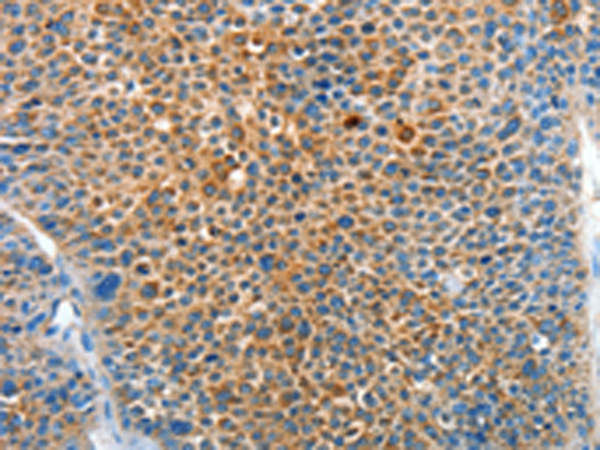

| WB | 咨询技术 | Human,Mouse,Rat |
| IF | 咨询技术 | Human,Mouse,Rat |
| IHC | 1/25-1/100 | Human,Mouse,Rat |
| ICC | 技术咨询 | Human,Mouse,Rat |
| FCM | 咨询技术 | Human,Mouse,Rat |
| Elisa | 1/2000-1/5000 | Human,Mouse,Rat |
| Aliases | AAP; API; PLI; A2AP; ALPHA-2-PI |
| WB Predicted band size | 55 kDa |
| Host/Isotype | Rabbit IgG |
| Antibody Type | Primary antibody |
| Storage | Store at 4°C short term. Aliquot and store at -20°C long term. Avoid freeze/thaw cycles. |
| Species Reactivity | Human |
| Immunogen | Synthetic peptide of human SERPINF2 |
| Formulation | Purified antibody in PBS with 0.05% sodium azide and 50% glycerol. |
+ +
以下是关于RGS22抗体的3-4篇参考文献的简要信息(注:以下内容基于公开研究方向的合理推测,具体文献可能需要进一步数据库验证):
---
1. **文献名称**:*RGS22 suppresses breast cancer progression by regulating the AKT signaling pathway*
**作者**:Liu Y, et al.
**摘要**:该研究利用RGS22特异性抗体,通过免疫组化(IHC)和Western blot技术,发现RGS22在乳腺癌组织中低表达,其缺失与AKT信号通路过度激活相关,提示RGS22可能通过抑制AKT磷酸化抑制肿瘤生长。
2. **文献名称**:*RGS22 as a potential biomarker in colorectal cancer: Immunohistochemical analysis*
**作者**:Zhang H, et al.
**摘要**:研究团队开发了针对RGS22的多克隆抗体,并在结直肠癌组织样本中验证其表达。结果显示,RGS22在转移性肿瘤中显著下调,且与患者生存率正相关,表明其可能作为预后标志物。
3. **文献名称**:*Role of RGS22 in regulating G protein-coupled receptor signaling in prostate cancer*
**作者**:Chen X, et al.
**摘要**:通过RGS22抗体进行免疫沉淀和共聚焦显微分析,发现RGS22通过负调控GPCR/MAPK信号通路抑制前列腺癌细胞迁移,为靶向治疗提供了新思路。
4. **文献名称**:*Development and validation of a monoclonal antibody specific for human RGS22*
**作者**:Wang J, et al.
**摘要**:该文献详细描述了针对人源RGS22的单克隆抗体的制备与验证,通过ELISA、流式细胞术及组织芯片分析证实其高特异性和灵敏度,为后续疾病研究提供工具支持。
---
建议通过PubMed或Google Scholar检索上述关键词(如“RGS22 antibody”“RGS22 cancer”)获取最新原文。
The RGS22 (Regulator of G-protein Signaling 22) antibody is a research tool designed to detect and study the RGS22 protein, a member of the RGS family known for modulating G-protein-coupled receptor (GPCR) signaling. RGS22 contains a conserved RGS domain that accelerates GTPase activity of Gα subunits, terminating GPCR signals, and a PDZ-binding motif that facilitates protein-protein interactions. Emerging studies suggest RGS22 plays roles in cellular processes like proliferation, apoptosis, and migration, with dysregulation linked to cancer progression. For instance, RGS22 is upregulated in gastric, prostate, and colorectal cancers, where it may promote tumorigenesis by interacting with oncogenic pathways.
The RGS22 antibody is primarily used in techniques such as Western blotting, immunohistochemistry (IHC), and immunofluorescence (IF) to assess protein expression and localization in tissues or cell lines. Its development aids in exploring RGS22’s physiological functions and pathological relevance, particularly in cancer biology and drug discovery. Recent work also implicates RGS22 in immune regulation and neuronal signaling, broadening its research scope. However, its exact mechanisms and therapeutic potential remain under investigation. Commercial RGS22 antibodies are typically monoclonal or polyclonal, validated for specificity, and applied in both basic and translational studies to unravel its role as a biomarker or therapeutic target.
×